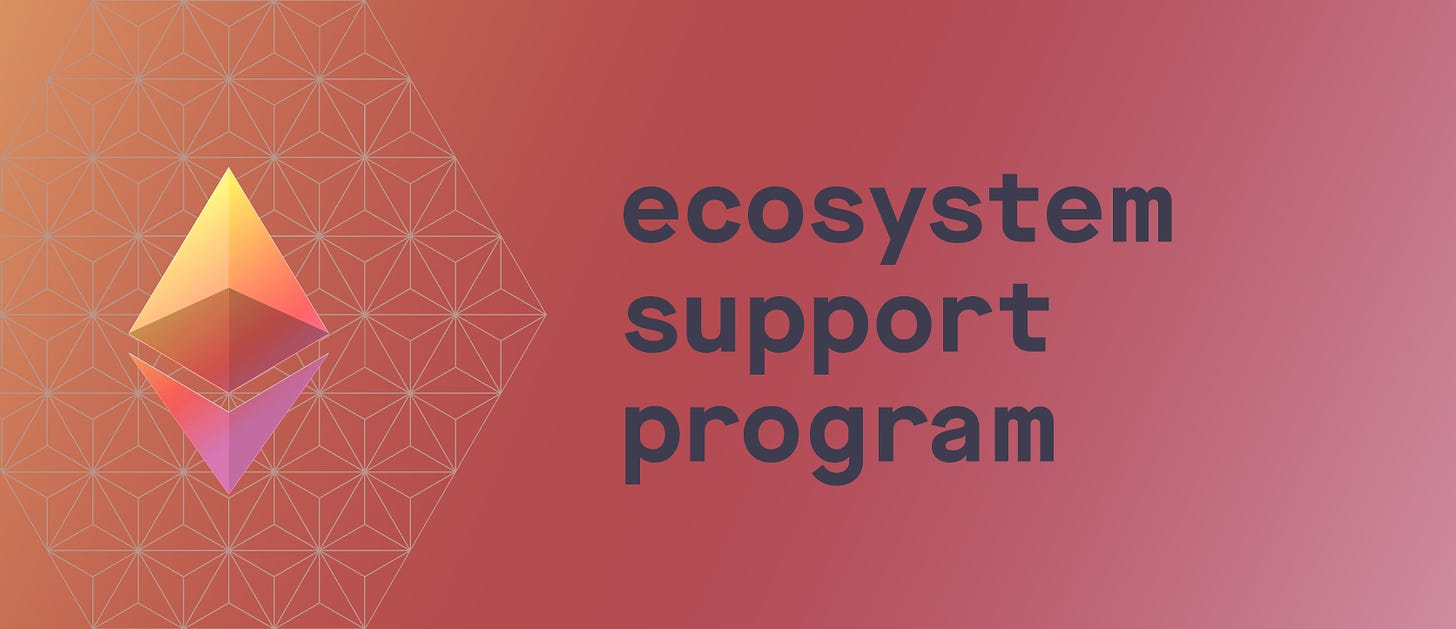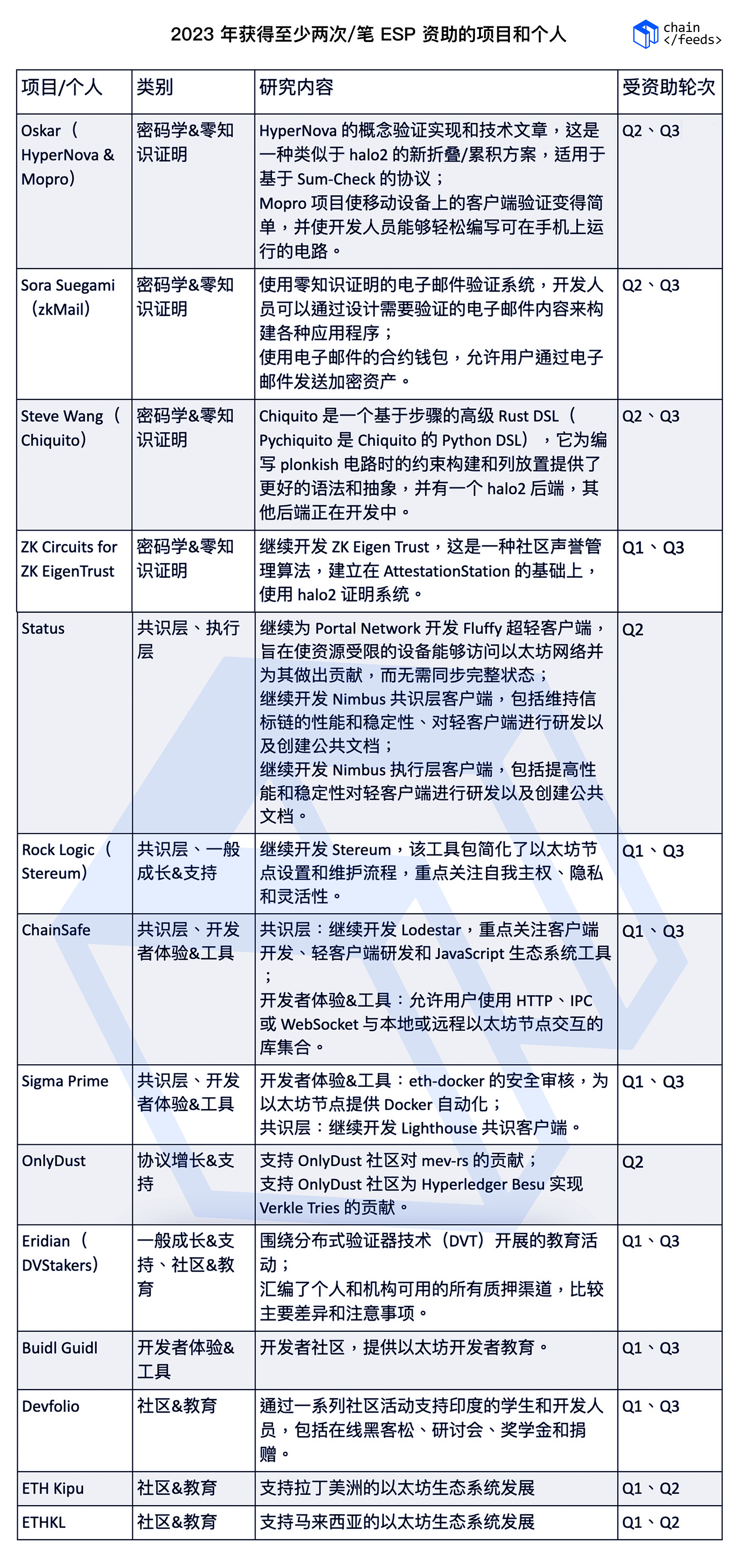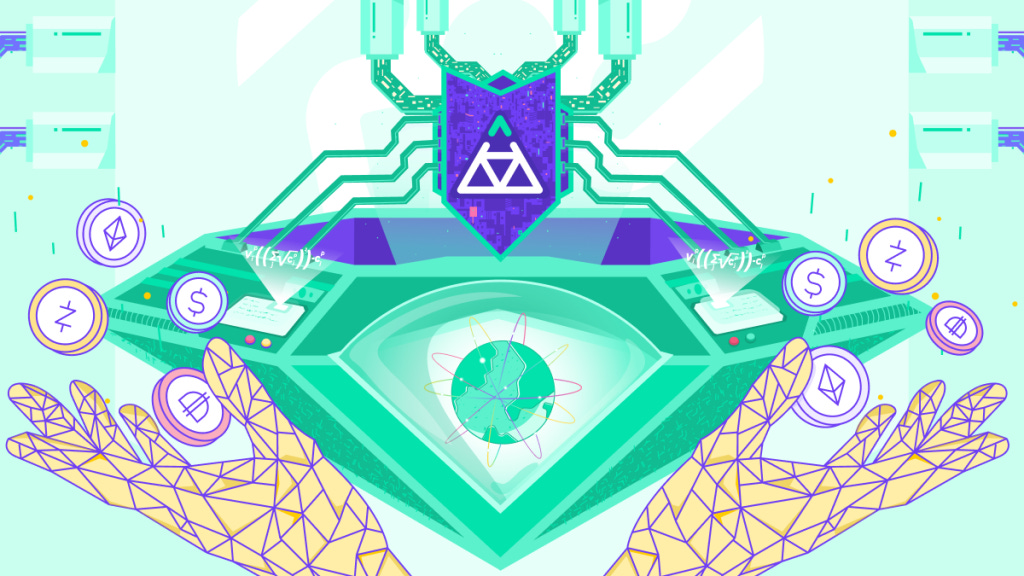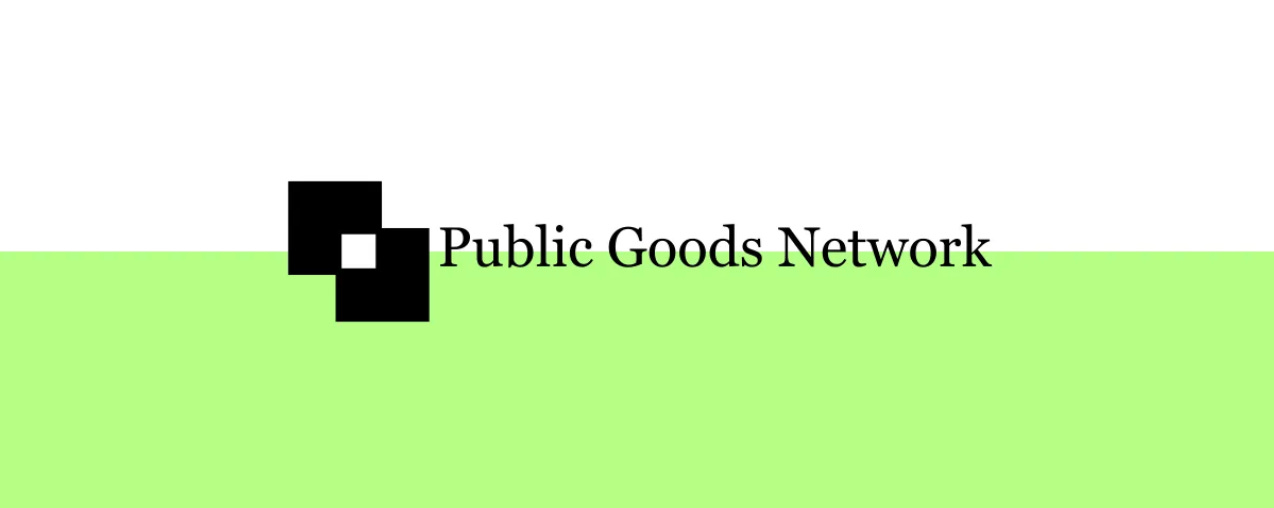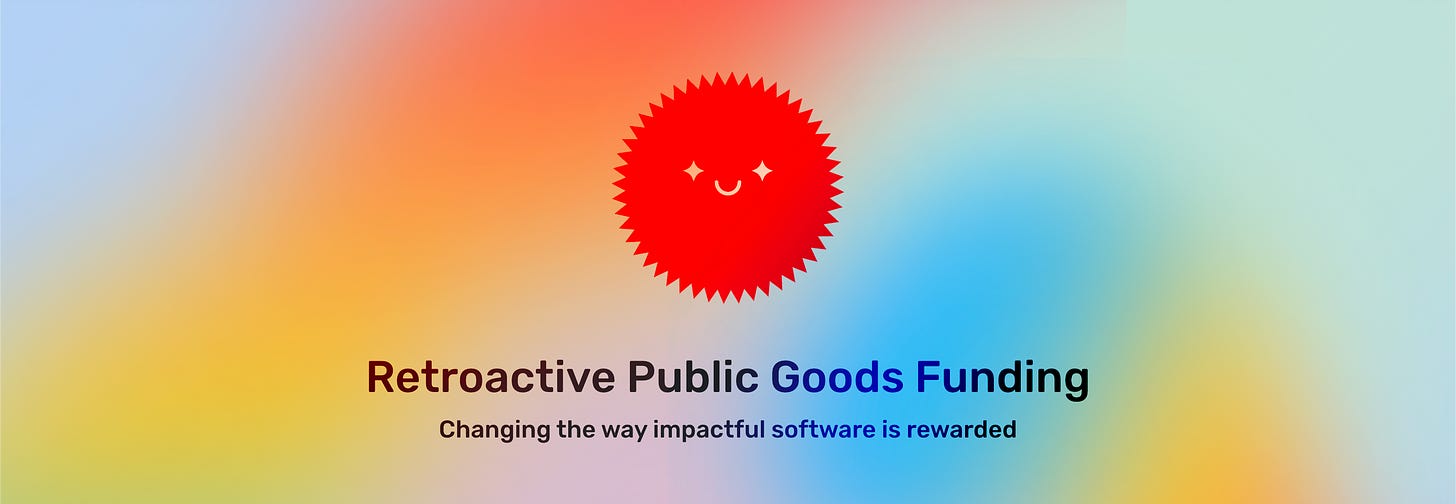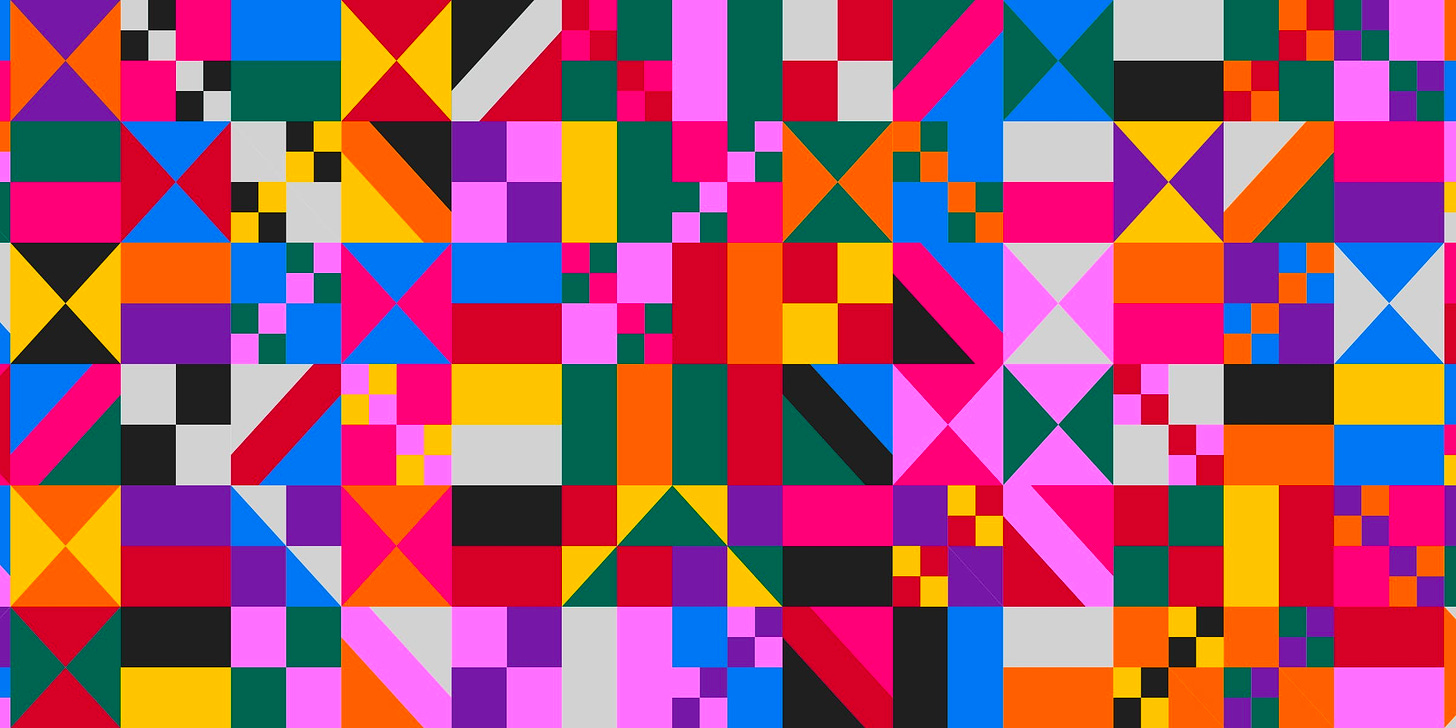复盘Web3 Grants 2023年捐赠轮次后,我们发现了哪些有意思的项目?
Web3 Grant can be understood as the agreement using part of its income or native tokens to incentivize protocols, projects or research that are beneficial to the entire Web3 ecosystem or a specific ecosystem. For projects, Grant not only provides financial support, but also means endorsement and diversified support; for large protocols, Grant helps retain developers, thereby promoting the development of the entire ecosystem.
This article selects the four most representative Grants, namely the Ethereum Foundation Ecosystem Support Program (ESP), Gitcoin Grants, Optimism RPGF and Uniswap Foundation Grants, trying to find hidden from the projects and research donated in 2023. of gems.
Ethereum Foundation Ecosystem Support Program (ESP)
Ethereum Foundation Ecosystem Support Program(Ecosystem Support Program,ESP) is an offshoot of the Ethereum Foundation focused on providing financial and non-financial support to teams across the Ethereum ecosystem.
In April 2015, the Ethereum Foundation launched DEVgrants, aiming to provide value for key components of Ethereums core software, its development process, or key parts of the ecosystem (public services, APIs, ABIs) (Note: Public information shows that DEVgrants Only the first batch of donation projects were announced, and there have been no subsequent updates); in March 2018, the Ethereum Foundation launched Ethereum Foundation Grants, aiming to expand support for projects that excel in scalability, practicality, and security; In November 2019, the Ethereum Foundation launched a new Ecosystem Support Program (ESP), shifting from DEVgrants focusing on the developer ecosystem to scalability-focused funding to building tools, infrastructure, research and public Universal support for the product.
ESP 2023 funding rounds:
the first season:63 projects, $12910616.53)
Second quarter:56 items, $9218158.34)
the third quater:98 projects, $8945982.74)
Fourth quarter: Not disclosed yet
Spotlight: Projects that have been funded more than twice
In terms of the number of donated projects, community education projects are the largest category, which is in line with the development stage of Ethereums overall technological maturity and ecological focus. Secondly, there is a focus on cryptography zero-knowledge proofs. The number of projects in this category ranks second, and there are many projects and research that have been funded by ESP for a long time.
The following are projects and individuals that will receive at least two ESP grants in 2023:
Gitcoin Grants
Gitcoin was founded in 2017 with the goal of supporting the development of open source projects and monetizing open source software through bounty programs. In 2018, Vitalik, one of the founders of Gitcoin, published a paper on Quadratic Funding, which means that the greater the number of donors, the more fund pool donations the project will receive. Gitcoin launched Gitcoin Grants in 2019 and became the first project to achieve secondary financing. The amounts raised by Gitcoin Grants for public goods from 2019 to 2022 are US$700,000, US$2.8 million, US$13.2 million, and US$21.4 million respectively.
Gitcoin Program Alpha Round and Gitcoin Program Beta Round are two testing rounds used by Gitcoin to test its Gitcoin Grants Stack built on the Allo protocol, a decentralized and customizable donation solution. Gitcoin Grant 18 and Gitcoin Grant 19 are regular financing in 2023. rounds, some of which are conducted on the Public Goods Network. Gitcoin Grants main focus is Web3 open source software, Ethereum infrastructure, climate solutions, and Web3 community and education.
Gitcoin 2023 funding rounds:
Gitcoin Grant 19 :471 items, $1.09 million
Gitcoin Grant 18 :480 items, $1.68 million
Gitcoin Program Beta Round:468 items, $1.857 million
Gitcoin Program Alpha Round:150 items, $1.667 million
Spotlight:Public Goods Network
Public Goods Network(PGN) is L2 led by Gitcoin and dedicated to creating lasting and recurring funds for public goods. PGN is built on Optimisms OP Stack and plans to spend the vast majority of sequencer fees on public goods projects. This means that PGN does not need to rely on external donations, but is self-sufficient on the endogenous costs of user interactions in the network.
It is worth noting that PGN plans to enable Contract Shared Revenue (CSR) in the future to meet developers’ needs for sustainable revenue sources. The Contract Shared Revenue (CSR) protocol EIP-6969 was proposed by Slingshot CTO zkCole and aims to incorporate an economic incentive mechanism for developers at the protocol layer.EIP-6969 A new Gas fee distribution mechanism based on EVMs L2 is proposed, allowing a part of the Gas fee to be used as a reward for contract developers. Once EIP-6969 is included in the Ethereum upgrade in the future, PGN may achieve considerable development due to its scale effect.
The PNG mainnet will be launched in July 2023. L2B EAT data shows that the PNG network currently has a TVL of US$1.57 million and a total of 4,200 addresses. It is still in a very early stage of development. According to PNG’s official plan, after 6 months of mainnet operation, fees will be assessed and allocated based on accumulated data. Expect more data and distribution rules to be revealed.
Optimism RPGF
Traceability of public goods funding(Retroactive Public Goods Funding, referred to as RetroPGF or RPGF) is a funding program that encourages projects related to Optimism. RPGF creates a startup-style funding cycle for public goods projects through revenue generated by the protocol (profits from the sequencer), retroactive public goods funding, and a Results Oracle. At the heart of RPGF is Vitaliks idea of retrospectivity, which is that it is easier to agree on what was useful than what will be useful.
RPGF 2023 funding rounds:
RetroPGF Round 2 (Q1):195 items, 10 million OP tokens
RetroPGF Round 3 (Q3):501 items, 30 million OP tokens
Spotlight:Protocol Guild
The Protocol Guild starts in 2022 as the one with the most donations in RetroPGF 2 and RetroPGF 3 (over 1.22 million OP received in total). The Protocol Guild is a collective of Ethereum contributors working to enhance the incentives that govern the core protocol. By maintaining an on-chain registry of its members, the Protocol Guild enables ecosystem sponsors to directly fund members, supporting their work and public good.
The original intention of the Protocol Guild was to pilot a new donation mechanism to achieve the purpose of gathering all protocol contributors into a financing mechanism and maintaining continuous updates. Specific to the implementation level, Protocol Guild’s large donations will be released to members within one year, while small/regular donations can be withdrawn by members at any time. The weight that each member can extract is calculated based on his contribution time to the ecosystem.
As of 2024, there are 161 members of the Protocol Guild, and a total of more than US$20.77 million has been donated. The Protocol Guild originally planned to conduct a one-year pilot from May 2022 to May 2023. The official website had few updates after a mid-term update in December 2022.
It is undeniable that Protocol Guild provides an attempt to distribute incentives on the chain (mainly at the contract level), but does not solve a fundamental problem: how to evaluate the value of contributions? Protocol Guild uses a simple and crude time factor, but in fact there is not much difference between members, which is quite a bit like sharing the same meal. This also makes subsequent evaluation difficult, that is, do financial incentives really promote members contributions? Finally, Protocol Guild members are currently limited to Ethereum developer organizations and leading ecological projects. Whether it can be expanded to more people, such as independent developers, in the future is also a question worth considering.
Uniswap Foundation Grants
Uniswap Grants Program(UGP) was launched following a governance vote in December 2020 with an allocation of US$1.5 million UNI for 6 months. UGPs initial priorities were narrow, MVP-only and intended to provide seed support for the developer ecosystem, and later evolved to support governance research, community building and education, and core protocol work. Inspired by the bull run in the crypto market, UGP lasted 18 months and distributed a total of $7 million in grants. In August 2022, Uniswap Foundation (UF) was established, UGP evolved into Uniswap Foundation Grants (UFG), and the budget was expanded to US$60 million for 3 years.
Uniswap Foundation Grants, as a typical ecological fund, are mainly established around the development of the Uniswap ecosystem. Uniswap Foundation Grants Wave 3 focuses on the following four categories: 1. Protocol growth, including donations to enhance the Uniswap v3 SDK and LP toolkit; 2. Research and development, including checkpointless TWAP oracles and cross-chain MEV market structure dynamics Research; 3. Community development, including supporting industry analysis around public goods and on-site events co-sponsored with FWB; 4. Governance management, including research on new governance structures and evaluation of governance information bridges.
Uniswap Foundation Grants rounds:
Uniswap Foundation Grants Wave 3 (June 2023):21 items, $990,000
Spotlight: 3 projects focused on by the Uniswap Foundation
The Uniswap Foundation specifically highlighted 3 grants: Checkpointless TWAP Oracle, Uniswap v3 SDK Rewrite, and LP University: Uniswap v3 Beginner to Intermediate Course.
AxiomrightResearch and prototype production of no checkpoint Uniswap v2 and v3 TWAP oracles: Research and development into this form of oracles has the potential to reduce the risk of oracle operations and increase the use of on-chain trustless oracles in DeFi applications that rely on oracles. The proof of concept eliminates the need for checkpoints in v2 TWAP and the caching overhead of v3 oracles. The Axiom team has extensive expertise in zero-knowledge systems and blockchain infrastructure.
Korayand Florians Uniswap v3 SDK Rewrite: This will support updates and improvements to the Uniswap v3 SDK, including updates to the JavaScript SDK documentation, updates to the existing v3 SDK code to make the architecture design more modern and efficient, and adding new test suite, etc. The team has extensive technical experience, including creating web3.swift (one of the most widely used cryptographic development tools on iOS) and reviving web3.js.
DoDaoCreated LP University: This will be an excellent resource for those who want to learn LP but don’t know where to start. The grant will be used to provide interactive educational experiences from beginner to intermediate levels to potential new mobility providers. The course will cover an introduction to AMM, basic knowledge of Uniswap v3, active and passive LP strategies, etc. The DoDao team has extensive experience in creating educational content for the crypto ecosystem.
what to do next
This article reviews the donations of mainstream foundations and projects worthy of attention in 2023. In the new year, we will continue to pay attention to and participate in research and discussions related to major foundations and public goods, including but not limited to:
Definition of public goods: Debates over the attributes of public goods of donated projects, such as discussions surrounding whether financially stable companies such as Alchemy should be included in RPGF funding;
Transparency: including transparency of the entire donation process, disclosure of the foundation’s financial situation, use of donated project funds, etc.;
Incentive evaluation: how to correctly incentivize projects of different sizes/types, how to evaluate incentive results, etc.;
New research: Dynamic research on the topic of public goods.


